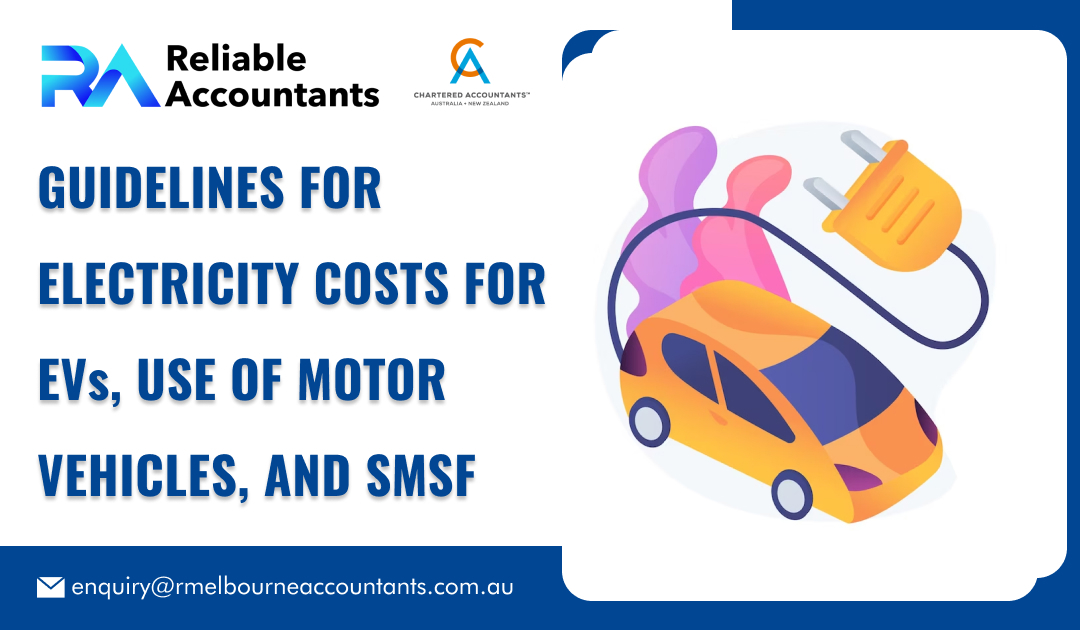In this blog, we’ll share rulings, determinations, and guidance by the ATO on electricity costs for EVs, private use of motor vehicles, LAFHA reasonable rates, and managing SMSF non-compliance.
Electricity costs when charging an electric vehicle at home
The ATO acknowledges that individuals who obtain work-related expenses relating to vehicles and employers with FBT obligations may face compliance challenges while trying to calculate electricity costs when charging an electric vehicle at home. The ATO has released a draft PCG that aims at identifying this challenge.
If the individual or employer satisfies some basic eligibility conditions, they can calculate the electricity costs when charging an EV at home by multiplying the sum of relevant kilometres travelled by the vehicle in the income year or FBT year by the EV home charging rate that is set initially at 4.20 cents per kilometre.
The guideline will apply:
- from 1 April 2022, for FBT purposes
- from 1 July 2022, for income tax purposes
It is not possible to use the guideline if the vehicle has an internal combustion engine and is a plug-in hybrid vehicle. Take a look at the following record-keeping requirements:
- The taxpayer is required to maintain a record of the car’s distance travelled during the relevant year using the odometer records.
- If the rate is being utilised for FBT purposes using the operating costs method, a valid logbook must be kept.
- In case an individual is using the logbook method to calculate deductions for a car, a valid logbook is required, and the individual must have one electricity bill for their residential premises in the relevant year to show they incurred electricity costs.
- For calculating deductions for a non-car vehicle, it is recommended to keep a log book and an electricity bill.
However, if odometer records have not been maintained by April 1st or July 1st of 2022, a transitional approach is available, and a reasonable estimate can be used based on service records, log books, or other available information.
FBT: private use of motor vehicles other than cars
The rates for calculating the taxable value of fringe benefits related to the private usage of motor vehicles (excluding cars) have been slightly increased from the previous FBT year, effective from 1st April 2023. The summary of the new rates is provided below.
| Engine capacity | Rate per kilometre |
| 0-2500cc | 62 cents |
| Over 2500cc | 73 cents |
| Motorcycles | 18 cents |
LAFHA Reasonable Rates
The specified amounts for food and beverage expenditures for employees who receive a living away from home allowance benefit have been established in this declaration, effective from 1st April 2022, whether the employee is in Australia or abroad. Below is a summary of the rates for individuals who are living away from home in Australia.
| Amounts of reasonable food and drink – in Australia | Per week ($) |
| One adult | 316 |
| 2 adults | 474 |
| 3 adults | 632 |
| One adult and one child | 395 |
| 2 adults and one child | 553 |
| 2 adults and 2 children | 632 |
| 2 adults and 3 children | 711 |
| 3 adults and one child | 711 |
| 3 adults and 2 children | 790 |
| 4 adults | 790 |
Dealing with SMSF Non-Compliance
When superannuation laws are violated by an SMSF trustee, the ATO will have the following options:
- a non-complying fund that is used as a last option for serious systemic problems
- release an enforceable undertaking
- release a rectification direction
- issue an administration penalty
- disqualify a trustee
When considering whether to release a rectification direction, the document helps the ATO officer to check the seriousness of the person’s behaviour, contravention, and compliance history along with any financial harm that a fund would suffer as a consequence of complying with a rectification direction. Additionally, most contraventions must be rectified within 6 months, or up to 1 year for extreme cases.
Legislation
Treasury Laws Amendment Bill 2023 comes with a series of measures, including:
- For subsidiaries of the future fund board, there is income tax exemption and franking credit refund.
- DGR registers reform – transfers practical duties for the assessment of registered DGR categories and the OAGDS from Ministers to the ATO.
- Matching/aligning excise and customs reporting with indirect taxes.
- Small-scale repackaging of beer into containers of small size – amends the Excise Act so that beer repackaging that would otherwise be considered manufacture under section 77FC of the Excise Act will not be considered to be the manufacture of the beer if it meets requirements.

